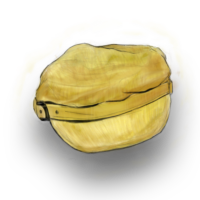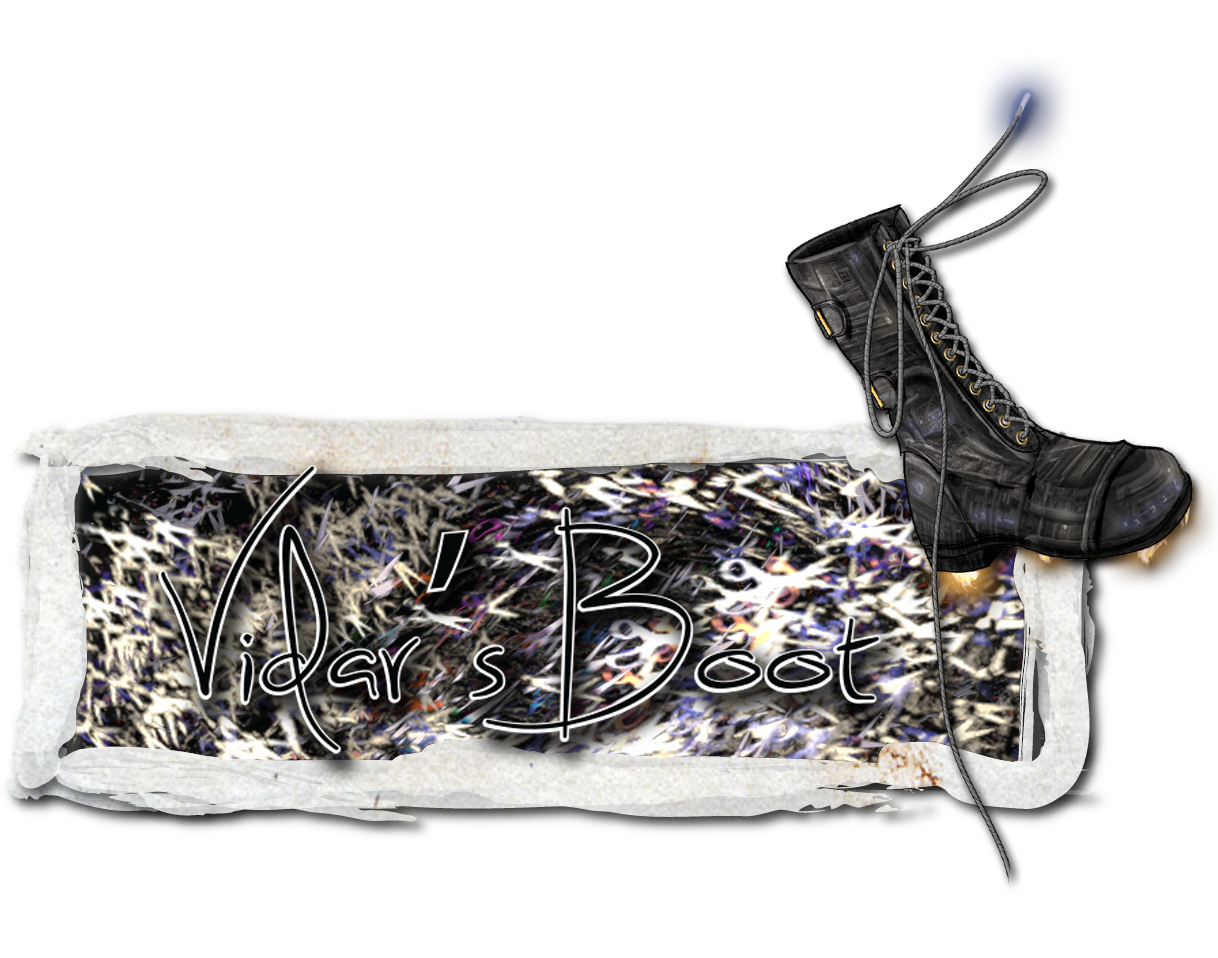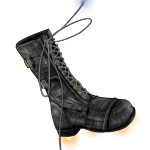– 7 –

I’ve quit, Emily insists, but quitting’s difficult. She can’t sleep at night, or get through more than a few hours of the daytime, unless she has something yellow on her head.
When she does manage to sleep, she dreams troubled dreams.
Then she wakes up and she looks in the mirror and she sees Gotterdammerung staring back.
Because you failed, says the voice of obsession in her head. Because you stopped. Because you would not contain Tom and Cheryl and their folly. Because you would not contain Edmund and his hunger.
She tries to think of Sid and Sid’s new freedom but she can’t. Her thoughts are mazed.
She cries.
Her grades plummet. She seeks counseling but the school counselors cannot help her. They can only encourage her to study hard and kill really big wolves. (For legal reasons: if that’s what she, of course, independently, considers best.)
She wanders into a diner.
She orders lunch.
Lucy’s sitting there. Lucy’s casting the runes. She’s casting them over and over again and frowning like she doesn’t want whatever it is that the future holds.
She’s got a tiny little hat on. It’s kind of goofy. But it makes Emily, who’s replaced her own hat with the smallest of yellow hairpins, smile in solidarity across the room.
Lucy grins at her. Then Lucy scowls hatefully at her.
Lucy Souvante turns away.
Somewhere else, Harold has an insight. It’s an appalling insight that people shouldn’t have. He tries to write it down before it escapes him. It’s a complicated spiral of mathematics and ideas and he’ll lose it all if he forgets —
The call almost startles Emily to her feet.
She clings to the leg of her table. She shudders so as not to rise.
It is like elevator music in the air around her. It is like Barry Manilow ballading on the sitar. It is like a cheerful twanging, distant and strange. It is a ballad Emily hears not with her ears but with her heart.
It summons her. It calls her to go and stand in a creepy circle around Harold, to make sure that he darn well forgets.
She grits her teeth. She ignores it.
It pulls at her. Her face is white. She splashes her glass of water in her face, she gets ice in a chilly trail down her top and is quite afraid that she has ruined her makeup utterly, even though she hasn’t, and she tries so very hard not to heed the call.
She trembles.
She doesn’t run off to stand in a creepy circle around Harold.
Suddenly it occurs to her that possibly that is the meaning of Lucy’s runes. Lucy is, after all, a prophet. Possibly the world is going to go up in flames and die and be lost forever right now because Emily is sitting there and not answering the call. Possibly she is the worst person in the world ever. She has to go —
She is halfway out the door, and then she remembers that she hasn’t paid her bill.
She remembers that self-fulfilling prophecies that everything is going to be OK don’t make people frown in irritation and frustration.
She remembers Navvy Jim saying “You should not have your yellow, yellow hat, Emily, nor be in your yellow House.”
She drags herself, step by step, back to her table.
You should not have your yellow, yellow hat, Emily, nor be in your yellow House.
She shudders there. She sits.
After a while it recedes.
After a while there’s a different kind of call. She picks up her cell phone. She puts it to her ear.
“Yo,” she says.
“Emily,” Lirabelle disapproves. “You didn’t show!”
“I was eating,” she says.
“We missed you,” says Fred.
Emily squints at Fred.
“Fred,” she says, “I am trying to impose the context of a phone call on this conversation.”
“It’s a conference call,” he hand-waves.
“No,” she says.
“Besides,” says Fred, “just because some of us like to hold phones to ears while we talk to the rest of the House doesn’t mean I should respect it.”
“I just want you all to leave me alone,” Emily says.
She puts her head down on the table.
People are staring at her. They are angry that she is on a cell phone even though it didn’t ring audibly and she isn’t talking aloud. They are very aware that she is dripping water from the glass of it she splashed on her face and on her front. It embarrasses her.
“I just want to not have to do this any more,” she pleads.
“But then there will be Gotterdammerung,” Morgan points out.
“Yeah,” says Fred. “You don’t want to be responsible for the world ending when you could hang out with cool people like us instead, do you? That’s like getting hit by a boomerang up both ends!”
“‘Going both ways,’” says Emily. “The phrase is ‘going both ways.’”
“Enh,” says Fred.
Emily sighs.
“I just —” she says. “I just — you saw him, right? Sid?”
“It’s not our job to take sides between cannibals and . . . masochists?” says Fred, after a while.
“I saw,” says Lirabelle.
“Or rather, we’re on the side of the masochists! Go, Sid!”
“That’s just swell, Fred,” says Emily.
“You are a hard person to eavesdrop on,” says Saul, “you know.”
Emily looks up.
He’s seated across from her. He’s grinning. His teeth and his eyes are white. The power of his new House is in him. Somewhere the jangling sitar of the call rings out, louder and louder and more frantic.
Oh, God, she thinks.
For a moment she imagines that they will abandon her. For a moment she thinks that it is only natural and logical that because she waited out the last call, she will be eaten. Because she wears not a yellow hat but only a little yellow butterfly pin in her hair — that she will be eaten.
Naturally.
She has rejected them so they will not show —
But there is a miracle held to Saul: he is still graced, and so is she. As suddenly as the sight of a butterfly on a summer’s day, Fred is there; and Lirabelle; and Veronica; Morgan, too; all of them, all the members of the Keepers’ House.
Guys, Emily silents, in profound relief.
Don’t look at me, teases Fred. I am trying to impose the context of a TV show upon this intervention.
I’m breaking the fourth wall! she says, even though in fact she’s just looking out through the window glass at Fred.
They have drifted into the scene from unknown places. They stand outside the glass; against the bar; by the door. They watch events unfold.
Saul raps the table for her attention.
She thumbs her amplifier. She says, aloud, “I’d thought you were a saint.”
His face twitches.
“You keep track?” he says.
“I was a fan.”
“Hm,” he says.
He pulls out the salt and pepper shakers. He sets them on the table between the two of them. He smiles at her.
“Hello,” he says. “My name is Saul. I was sorted into the House of Hunger, but it was my second sorting; before that I was a saint. We were three; we were two; now we are one, and I think Peter shall not endure much longer. You have been a trouble to my brothers and sisters in Hunger. You stand around creepily and distract us when we want to eat. More importantly, you interfere with Edmund’s understanding and breaking the chain that holds Fenris Wolf.”
“That’s not true,” says Emily.
Hunger surges in his eyes. It’s like a blow. She shrinks back against her seat.
But, but, I was quitting, I was quitting —
“It is your turn to introduce yourself,” Saul says.
“My name is Emily,” she says.
Oh God, oh God, oh God.
“I was quitting,” she whispers.
Saul looks around.
“And yet they defend you,” he says. “How noble. How awkward.”
He bares his teeth. He moves, suddenly, towards Lirabelle.
Lirabelle is no longer leaning against the bar. Lirabelle is outside, on the street, on the other side of the street, still looking in.
Saul isn’t even out of his seat. He laughs.
“Please,” says Emily. “What do you want? I don’t want to fight you.”
“A long time ago,” says Saul, referring to late in the previous year, “a boy named Tom made a hat. He thought that he was making a hat to free his mind, but is his mind freed? No. So we can safely rule that out as his ultimate purpose. He made a hat, in order that the wolf could be unchained.”
Emily shakes her head.
Saul is quiet. He waits long enough for her to have a sudden thought; to lift a finger, as if to make a point —
He interrupts her. “You are thinking: but most of what the hat does has a different purpose, and it has created things that appear to actively oppose the freedom of the wolf.”
He rubs at the back of his head.
“I do wish they would stop staring,” he asides. “This is becoming very difficult.”
The pressure lightens for a moment. Fred pretends to be paying a great deal of attention to the specials, which are posted on the outside of the diner’s door. Morgan is tying his shoes. Lirabelle is on the phone.
“My,” says Saul.
Emily shrugs a little.
“Your point is irrelevant,” Saul says. “I will explain myself further: it is natural. It is natural for anything, for anyone, who is destined for a certain activity to spend a great deal of their time fighting it, denying it. It is . . . almost the nature of purpose, do you understand? To live, to strive, is to be your own worst enemy. Where we dream, where we hope, where we hunger, we push these things against the world. This forms a . . . limning. A rip. An edge. From that edge arise monsters: things which are opposing our purpose. Make a hat to free the wolf: create Sid, whose willing suffering helps chain it; make you Keepers in your yellow hats, whose staring eyes do the same. To act is to create opposition. — You see?”
He traces patterns in the table with his finger.
“The world demands that you be slaughtered and eaten,” he says, with a gentle smile. “But you struggle against that, and in so doing create such torments for yourself as ‘fear’ and ‘pain’ and ‘suffering.’ Will you live? Will you die? Either way you have bound yourself in your own boxes; created your own chains; given birth to your own enemies. It is not my teeth you fear but the shadow-self of your own dignity.”
She looks away.
“You offer your neck?” says Saul.
She glares back at him, and her eyes gleam gold, and he shudders. His thoughts fall into confusion. He grits his teeth. Then he finds a place of deep calm within him, under the gales of confusion, and says:
“I wanted to make you an offer.”
“No,” she says.
“Give up your suffering,” he says. “Lay down your power and your chains. Give yourselves to us; we will make an end to you; we will break the thing that makes you suffer, and your willingness will lathe away the pain. And then there will be no yellow House to bear witness to the wrong we do, and Fenris — no. Not Fenris. All bound and tormented, captive things. All our monsters, our hungers, and our prisoners, we will let them free.”
“No,” she whispers.
He reaches out for her. The hunger in him is drowning her. His hand is on her cheek, despite the glare of her. “Everybody wins,” says Saul, of the House of Hunger, and somehow that breaks the spell on her. Suddenly the fear in her tumbles past fear into a wild place of freedom and she grins at him, so brilliant and bright.
He winces. Her eyes burn like the sun.
Joy runs through her, and she leans in, and she tells him, very softly, “I don’t want to be eaten.”
“Pardon?”
“Don’t you get it? I don’t like you. I liked Sid. Sid was OK. But I don’t like you people and your ‘sometimes the way to free people is to kill them.’ I took off my own damned hat. I don’t need you. And I’ll be damned if I’m going to die at the maw of some hungry saint. I’m not going to be your lunch, Saul. Order a sandwich or something. They’ve got cheesecake. I — I’m going to live a long time, and dance the Thunder Dance, and die in a beautiful place, surrounded by something wonderful.”
He is too close. She grabs him by the ears. She slams his face into the salt and pepper, prompting an unpleasant bout of dizziness and sneezing. She flits to her feet.
He tries to get up but they are staring at him.
Their eyes are gold and they are dizzying him and he is struggling, he is staggering, he cannot remember who he is, where he is, there is something he is clutching, something he is holding tight inside him, something precious, but his spiritual hands, they start to slip —
“You have been corrupted,” Emily says. “You have been damaged by the hat, Saul. I’m so sorry, but you’ve been damaged. Your brain wasn’t a good fit for it. You weren’t a good fit for it. The hat doesn’t want to free the wolf. The purpose of hats isn’t to free the wolf. The purpose of a hat is to keep wolves bound.”
His head is ringing like a xylophone that somebody’s playing. His world is streaked with red, with yellow, and with white.
She is standing. She is turning. She is leaving. Saul cannot think —
Fred is gone.
Emily looks over sharply. Her brain cannot parse it.
Lirabelle is gone. Veronica is gone.
Saul clutches tighter at his miracle. His head begins to clear.
Morgan —
Run! screams Emily. She thumbs her marvelous speech amplifier. “Run!”
It booms across the block. People are scattering. The Keepers’ House disperses, leaving only Emily, Saul, and their dead; and, sitting on the floor, gnawing thoughtfully on Lirabelle’s arm, the Lucy-beast.
There is a burgeoning breath of pain in Emily. “I —”
“Ah,” says Saul. “I have backup.”
“I —”
“Thank you, Lucy,” Saul says.
Lucy waves a hand vaguely at them.
“What the hell,” says Emily. “What —”
Their lives were jewels.
She tries to say it. She can’t. She flicks the speech amplifier to maximum volume but there aren’t words in the human voice for this; not words in the human mind for this; she can’t express it. She just sniffles and mouths a silent wordlessness; then, far too quietly even for the speech amplifier to pick up, she speaks the names of her House’s dead.
Lucy walks over.
Lucy pats her on the head. Emily’s mouth twists. She is going to tell Lucy a secret. She is going to tell Lucy a brain-shattering secret, speak a forbidden name, shout it, even, leave her to writhe mindless and broken on the floor, and turn, and burst Saul’s mind —
But Lucy gets there first.
“I don’t think hats are for anything at all,” she says.
And Lucy is far away again. Lucy is smug, and safe, and she disdains Emily; and Emily’s vision pulses with white and gold confusion and she slumps against the diner’s bar.
A couple nights later, wandering aimlessly, eyes flickering between their normal blue and gold, she hears the Thunder Dance.
She slips in to the Konami Thunder Dance club. She watches Meredith duel with Paul.
There is magic in it and Emily’s eyes almost glow gold; almost suppress it, because that’s what she does, that’s what she can’t help doing, in her Keepers’ House.
Only, somehow, that’s left her. Somehow that’s all done. The Symbols stay Symbols. The world is full of change.
She can’t help wanting to bind it down to sanity, almost as much as she wants not to.
She can’t help wanting to bear witness to the idea that somehow, people using the Thunder Dance to hack the world with their footsteps is wrong, that it is bad, that people ought not do such things as dance the Symbol GRAVES and rouse up ghosts.
But she can’t, and she doesn’t want to, so she doesn’t. She relents. She just watches.
In the middle of the symbol GRAVES Meredith tries to slip in Dynamite.
Nothing happens.
Meredith looks embarrassed. She’s off her game. She had forgotten. That move was bug-fixed.
And Emily slips off to sleep there, among the unexploded spirits of her dead.


